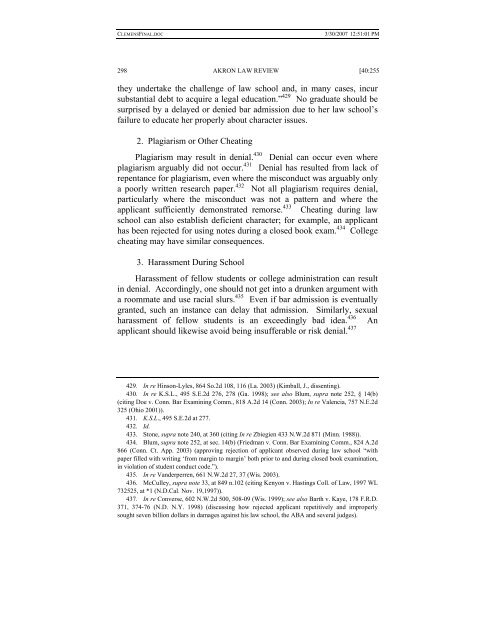Facing the Klieg Lights: Understanding the "Good Moral Character"
Facing the Klieg Lights: Understanding the "Good Moral Character"
Facing the Klieg Lights: Understanding the "Good Moral Character"
Create successful ePaper yourself
Turn your PDF publications into a flip-book with our unique Google optimized e-Paper software.
CLEMENSFINAL.DOC<br />
3/30/2007 12:51:01 PM<br />
298 AKRON LAW REVIEW [40:255<br />
<strong>the</strong>y undertake <strong>the</strong> challenge of law school and, in many cases, incur<br />
substantial debt to acquire a legal education.” 429 No graduate should be<br />
surprised by a delayed or denied bar admission due to her law school’s<br />
failure to educate her properly about character issues.<br />
2. Plagiarism or O<strong>the</strong>r Cheating<br />
Plagiarism may result in denial. 430 Denial can occur even where<br />
plagiarism arguably did not occur. 431 Denial has resulted from lack of<br />
repentance for plagiarism, even where <strong>the</strong> misconduct was arguably only<br />
a poorly written research paper. 432 Not all plagiarism requires denial,<br />
particularly where <strong>the</strong> misconduct was not a pattern and where <strong>the</strong><br />
applicant sufficiently demonstrated remorse. 433 Cheating during law<br />
school can also establish deficient character; for example, an applicant<br />
has been rejected for using notes during a closed book exam. 434 College<br />
cheating may have similar consequences.<br />
3. Harassment During School<br />
Harassment of fellow students or college administration can result<br />
in denial. Accordingly, one should not get into a drunken argument with<br />
a roommate and use racial slurs. 435 Even if bar admission is eventually<br />
granted, such an instance can delay that admission. Similarly, sexual<br />
harassment of fellow students is an exceedingly bad idea. 436 An<br />
applicant should likewise avoid being insufferable or risk denial. 437<br />
429. In re Hinson-Lyles, 864 So.2d 108, 116 (La. 2003) (Kimball, J., dissenting).<br />
430. In re K.S.L., 495 S.E.2d 276, 278 (Ga. 1998); see also Blum, supra note 252, § 14(b)<br />
(citing Doe v. Conn. Bar Examining Comm., 818 A.2d 14 (Conn. 2003); In re Valencia, 757 N.E.2d<br />
325 (Ohio 2001)).<br />
431. K.S.L., 495 S.E.2d at 277.<br />
432. Id.<br />
433. Stone, supra note 240, at 360 (citing In re Zbiegien 433 N.W.2d 871 (Minn. 1988)).<br />
434. Blum, supra note 252, at sec. 14(b) (Friedman v. Conn. Bar Examining Comm., 824 A.2d<br />
866 (Conn. Ct. App. 2003) (approving rejection of applicant observed during law school “with<br />
paper filled with writing ‘from margin to margin’ both prior to and during closed book examination,<br />
in violation of student conduct code.”).<br />
435. In re Vanderperren, 661 N.W.2d 27, 37 (Wis. 2003).<br />
436. McCulley, supra note 33, at 849 n.102 (citing Kenyon v. Hastings Coll. of Law, 1997 WL<br />
732525, at *1 (N.D.Cal. Nov. 19,1997)).<br />
437. In re Converse, 602 N.W.2d 500, 508-09 (Wis. 1999); see also Barth v. Kaye, 178 F.R.D.<br />
371, 374-76 (N.D. N.Y. 1998) (discussing how rejected applicant repetitively and improperly<br />
sought seven billion dollars in damages against his law school, <strong>the</strong> ABA and several judges).
















